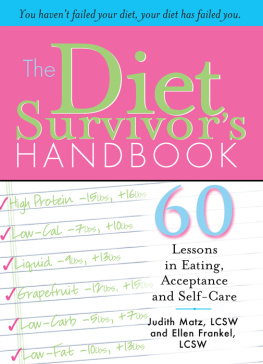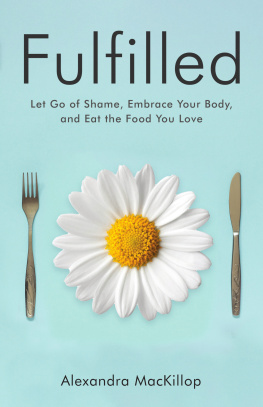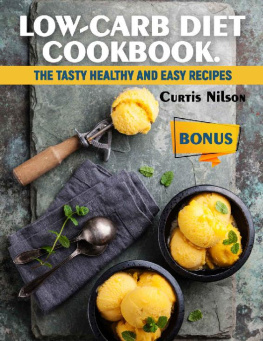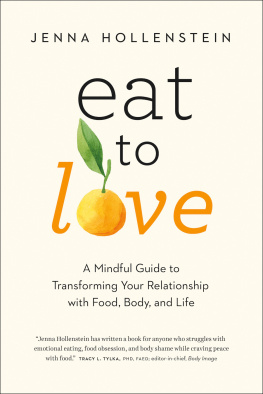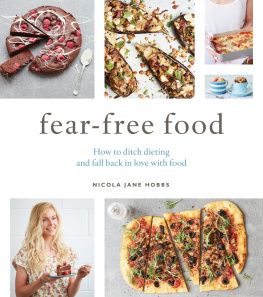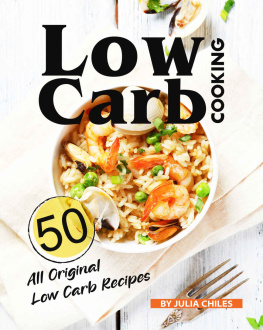LESLEY KINZEL
TWO WHOLE CAKES
How to Stop Dieting and Learn to Love Your Body

Published in 2012 by the Feminist Press
at the City University of New York
The Graduate Center
365 Fifth Avenue, Suite 5406
New York, NY 10016
feministpress.org
Text copyright 2012 by Lesley Kinzel
All rights reserved.
No part of this book may be reproduced, used, or stored in any information retrieval system or transmitted in any form or by any means, electronic, mechanical, photocopying, recording, or otherwise, without prior written permission from the Feminist Press at the City University of New York, except in the case of brief quotations embodied in critical articles and reviews.
First printing January 2012
Cover design by Herb Thornby, herbthornby.com
Text design by Drew Stevens
Library of Congress Cataloging-in-Publication Data
Kinzel, Lesley, 1977-
Two whole cakes : how to stop dieting and learn to love
your body / Lesley Kinzel.
p. cm.
ISBN 978-1-55861-794-0
1. Overweight womenPsychology. 2. Body image in
women. 3. Self-esteem in women. I. Title.
RC552.O25K53 2012
616.3980082dc23
2011040807
In memory of Jill Taylor
Contents
I cannot remember a time in my life when I didnt know I was fat. It is an understanding that has pressed down on me with more gravity than anything else ever could. Our culture is steeped in ideologies of aspiration and one of the most inescapable is the pressure to meet narrow standards of beauty and health, standards that are arbitrary and often damaging.
But wait! you object, dont you know theres an obesity epidemic? Its impossible not to know. All over the media, fatness is heralded as a major health crisis, a mounting threat to the American way of life. Hell, its the end of human civilization. Even our children are fat! It is unthinkable. In a contemporary reworking of ancient combat in which the crowd cheers for the lions, fat people are tormented by screaming fitness trainers on national television and people tune in by the millions to watch with unrestrained delight as offensive bodies are elevated from fat sin to starving, dehydrated sainthood. Like modern-day gladiators, these combatants battle fiercely not with an external enemy, but with themselves. This is no longer just an obesity epidemic as defined by those whod seek to pathologize and condemn our bodies. It is a fat rampage. And some fat people are responding in kind. Fat people are finding their voices, standing up, speaking out, and taking back their bodies.
This book is a transmission from that battlefield. It is a product of ten years of discussions, arguments, and revelations taking place in and around body acceptance and social justice movements. It is an analysis of intersectional identities and the complex realities of survival as a self-accepting person in a world that loathes self-acceptance. It is my story. It is also the story of many others who have fought for recognition and respect, and the right to live in their own bodies according to their own desires. It is memoir, conversation, cultural critique, and self-acceptance instruction manual.
According to the dubious measurements of the body mass index (BMI) scale, I am morbidly obese. To put it more succinctly, I am death fat. I am superduper really-for-real mad fat. I am the kind of fat where doctors are friendly until they get me on a scale, and then after that they get very quiet. Oh, I imagine them thinking, I didnt realize you were that fat. I am the kind of fat that occasionally outsizes plus-size shops. I am the kind of fat that people reference when they say, Well, some people are just big, but people who are REALLY fat are just not normal or healthy, and those people SHOULD lose some weight. When they say this sort of thing, they are talking about me.
Furthermore, I adore cooking and refuse to keep anything less than real butter in my house. I eat very little meat but not for moral or ideological reasons; I just dislike preparing it. My diet consists primarily of fresh vegetables and whole grains, and I have a serious weakness for good cheese. I keep a jar of bacon fat in my refrigerator and I occasionally use it to cook big leafy greens, because big leafy greens do best with a bit of bacon fat. I exercise; I have a gym membership and I use it. I take the stairs at work five or six times a day, but only because I am too impatient to wait for the elevator. By the tests and non-BMI numbers doctors use to measure such things, I am healthy.
I have a partner who unconditionally supports my self-acceptance, while struggling with his own. I have a decidedly not-fat family that is mostly supportive of my choices and realities except for the very occasional lapse into the but Im just worried about your health rhetoric.
I have been fat in varying degrees my whole life. Though Ive lost and regained many a pound, Ive never lost enough weight to feel a glimmer of what it might be like to be thin. Ive never lost enough weight to come close to being not fat. Never enough to shop in not-fat stores. Never enough that I wouldnt occasionally hear fat bitch hollered at me from a moving car when walking alone, on a city street, or in a parking lot. Never enough that a doctors ever said I was of a normal weight. Never enough that I didnt, even for a second, feel like I wasnt fat anymore.
Now some folks will read this and think, oh, how sad. But theres no sadness here. I am, plainly, morbidly obese. Death fat. I say this without judgment and without disdain. I say it not with an eager ring of reclamation, nor with self-loathing and fear. It just is. I live fully in this real and complicated world.
This is a book about many things, but it is mostly about refusing to be sorry.
T here exists a social justice movement focused on criticizing our conventional wisdom about bodies and fat, and on changing our culture to create space where a diversity of bodies is respected and normalized. Different folks call this ideology by different namesfat activism, fat acceptance, fat liberation, fat advocacy. The common ground we all stand upon is the desire for fat bodiesand all bodies, no matter their circumstancesto be seen as worthy of dignity and respect. Fat politics is a movement of criticism and questions, not authority and groupthink. Its purpose ought to be noisy inquiry into what our culture tells us about bodies. Its purpose is not to replace one set of monolithic rules with another. We want fatness to be disentangled from its association with moral decrepitude, and for fat bodies to be understood as validnot temporary, not disposable, and not loathsome.
Your body is not a tragedy.
This is important. This is something you should know before we go any further. Speak it aloud if it helps. Write it down. Tell someone, My body is not a tragedy. Whatever else it might be, it is not tragic. Tragedy may yet befall it, or may have already done so, but your body is not the things that happen to it, the things that are forced upon it, or even its failures to perform to certain standards. Your body simply is. The tragedy is the effort required to build a loving relationshipor at least one of tacit acceptancewith your body. In a more perfect world, this connection would take place organically, but any such connection built in our early years is rapidly undone as we learn to criticize and dissociate from our bodies. Then we must spend our remaining years trying to rebuild that relationship.
Next page

